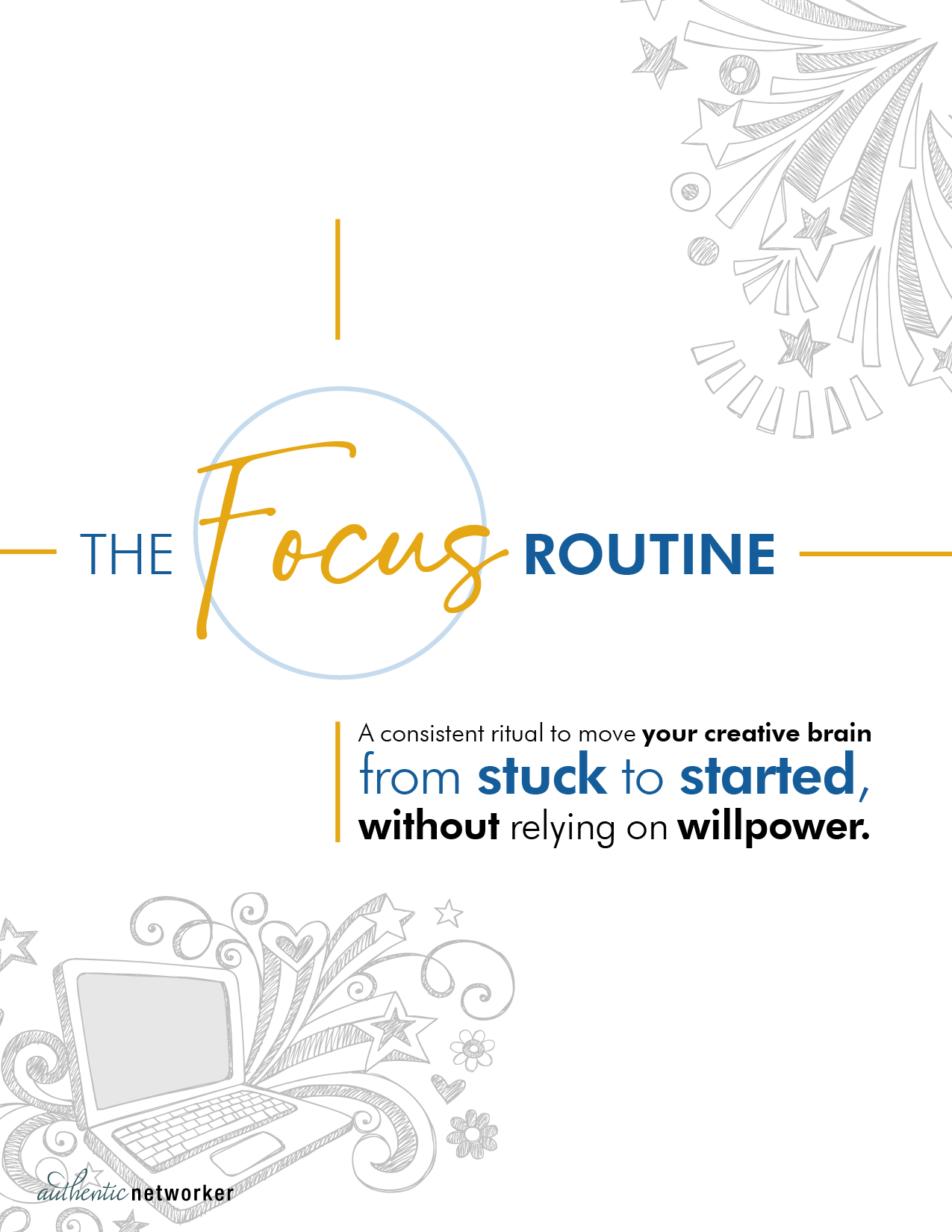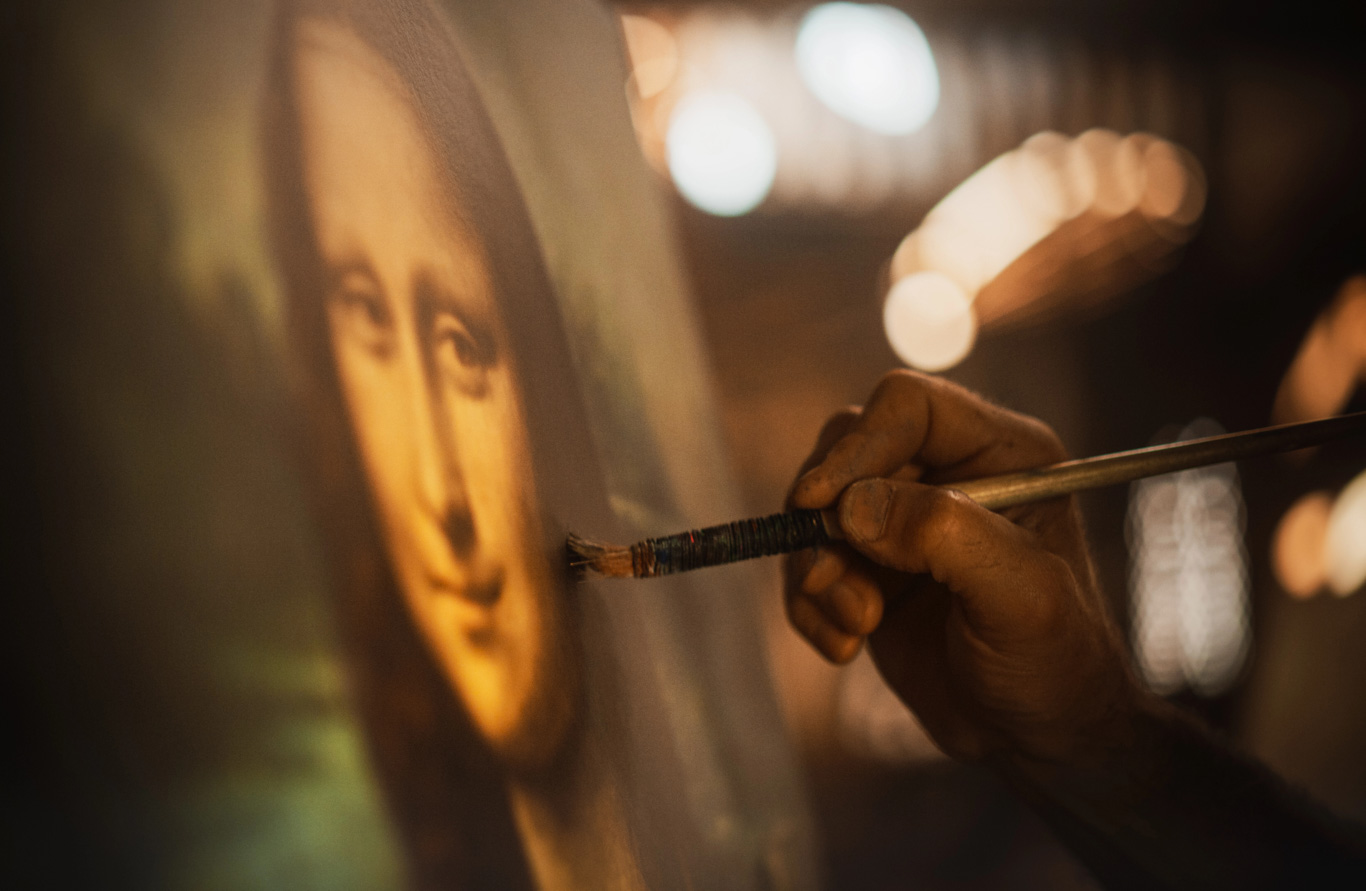Start Before You're Ready: Taking Action in the Face of Uncertainty


Ever keep waiting to feel ready—only to watch your idea gather dust?
This episode will change how you think about beginnings.
Ever keep waiting to feel ready—only to watch your idea gather dust?
This episode will change how you think about beginnings.
You don’t need clarity to start. You don’t need confidence. You just need one honest step in the direction of what matters.
Through the stories of Darwin, Beethoven, and Harper Lee, Mia explores what world-changing procrastinators can teach us about hesitation, self-doubt, and the myth of perfect timing. You’ll hear why readiness is something we build—not something we wait for—and how to take action even when the stakes feel high and your inner critic is loud.
This one’s for the solopreneurs, creatives, and quietly brilliant people sitting on half-finished magic. The moment to begin is rarely comfortable—but it’s always available.
------------
🧰 The Focus Routine
If your to-do list feels like a wall , this is the ladder .
✨ Download my free ADHD-friendly Focus Routine—a short, structured ritual that helps your brain start (without the fight).
Perfect for solopreneurs, creatives, and anyone currently locked in an eye-staring contest with their blank screen.
👉 authenticnetworker.com/focusroutine
------------
🌊 Wavelength: Your Virtual Coworking Oasis
Stop trying to focus alone. That’s a solo sport no one trained us for.
Wavelength is my cozy online coworking space built for the neurospicy among us. We use body doubling, shared structure, and gentle accountability to help you get unstuck and stay with it .
Whether you're deep in a launch or just trying to answer your damn email, there's a place for you here.
👉 authenticnetworker.com/wavelength
------------
📚 Further Reading for Curious Brains
(Not to be pursued at the expense of actually starting. You know who you are.)
🧬 Charles Darwin & On the Origin of Species
Darwin, Charles. On the Origin of Species by Means of Natural Selection (1859).
Referenced in this episode as a case study in glorious, prolonged procrastination. 📖 Read it free on Project Gutenberg
Browne, Janet. Charles Darwin: Voyaging (1995) and The Power of Place (2002). Everything you ever wanted to know about Darwin’s brain, hesitation, and that Wallace letter plot twist.
Wallace, Alfred Russel. On the Tendency of Varieties to Depart Indefinitely from the Original Type (1858). AKA the moment Darwin realized he’d better hit publish.
🎼 Ludwig van Beethoven & Für Elise
“Für Elise” (Bagatelle No. 25 in A minor), composed ~1810, published posthumously in 1867.
Mysterious muse? Check. Timeless melody? Also check.
🖋 Harper Lee & To Kill a Mockingbird
Lee, Harper. To Kill a Mockingbird (1960). The Pulitzer-winning debut that took major courage to publish.
Shields, Charles J. Mockingbird: A Portrait of Harper Lee (2006).
- A peek inside the writer’s reclusive, powerful creative life.
------------
Episode keywords: start before you're ready, overcoming perfectionism, creative procrastination, how to stop procrastinating, purpose-driven productivity, ADHD-friendly momentum, imperfect action, get started on big ideas, solopreneur motivation, clarity after action, overcoming fear of failure, high-stakes creativity, waiting for the right time, Notes app ideas, self-doubt and action, productivity for creatives, Darwin and procrastination, Beethoven's messy process, imposter syndrome help, resistance to starting, how to launch before you're ready, storytelling inspiration, getting out of your own way
What if the idea you keep saving for later is exactly what the world needs right now? Today, I'm sharing stories of people who almost didn't share their work and why the world is better because they finally did.
3, 2, 1. Let's go. Welcome to Transition Space, your gateway from thinking to doing. I'm Mia Torr. If you're called to create meaningful work, use this podcast as part of your starting ritual. Make your coffee and clear your desk while you listen, and we'll hang out as you ease into focused flow. While you create your space, I'll help you entertain the transition. Come on in.
Today on Transition Space, a story about greatness almost missed and what happens when you start before you're ready.
Let's talk about the fear that the world just isn't ready for what you have to say.
Let's rewind to 19th-century England. The world looked different, but one thing hasn't changed. People weren't exactly lining up to have their worldview challenged. Religion and science were still tightly braided together. And the dominant belief in science was that every species had been created exactly as-is. No edits, no upgrades, just done.
Enter Charles Darwin.
Darwin wasn't a rebel, not a fire starter, just a quiet, curious guy who really liked beetles. That quiet obsession with insects soon evolved into a far bigger journey, one that would carry him across oceans and into history.
Darwin stepped aboard the HMS Beagle, the salty sea air mingling with anticipation, ready to chart unknown territories. As a naturalist aboard that boat, he spent five years mapping coastlines, collecting fossils, and sketching finches, while watching the pieces of a radical idea start to fall into place,
Darwin noticed patterns. Tiny variations between species separated by a few miles. Changes so small they almost went unnoticed. But once you saw them, you couldn't unsee them.
Darwin's observations hinted at a deeper truth. Species weren't as unchanging as society believed. These clues told him life wasn't fixed. It was changing slowly and invisibly over time.
And that idea, it wrecked him a little. Because if it was true, it didn't just upend biology, it challenged God, society, and the whole fragile tower of human exceptionalism.
He had the evidence, but he also had everything to lose. The stakes were staggering. Darwin grappled with the potential backlash, not just from the church, but from a society unready to challenge its foundational beliefs. He was facing the ridicule of the public and the judgment of his peers, who would say he'd gone too far, seen too much, asked the wrong questions.
So he did what overthinkers and overachievers do best. He dove deeper. Darwin researched, revised, folded big questions into even bigger questions, quietly and obsessively, all the while sitting on the biggest idea of his life.
He turned his theory of natural selection over and over in his mind. He second-guessed himself. He wrote with so much care that if you read it today, you can still feel the tension between conviction and caution in every line.
Darwin waited on publishing for 20 years. Twenty. Years.
And then- confirmation.
One day, a young naturalist named Alfred Russell Wallace sent Darwin a letter. Working independently, Wallace had arrived at a strikingly similar theory of natural selection. Wallace hadn't copied him, but he'd come to the same conclusion, and fast.
For Darwin, it was a jolt. The clock had started ticking. If he waited much longer, he might lose the chance to share his life's work on his own terms.
Receiving Wallace's letter lit a fire under him. Darwin still didn't feel ready. He was terrified. But he finally published his work.
What he shared didn't just survive the backlash. It reshaped biology forever. On the Origin of Species became one of the most influential scientific works in history. To this day, debates over his theory persist, and resistance lingers. Yet his courage to share his insights laid the foundation for modern scientific thought.
Next, let's talk about a different kind of fear. The fear that putting your work out there means putting yourself out there, too.
A handwritten melody, sealed away like a secret.
There's something impossibly tender about Beethoven's Für Elise. It feels like a love letter, a private moment, a piece of someone's soul that was never meant for the world.
Historians believe Beethoven may have composed it in 1810 as a gift to Therese Malfatti, a woman to whom he proposed but who ultimately rejected him. Others think it might have been written for a different Elise entirely. No one knows for sure. But here's what we do. He wrote it and then tucked it away.
Maybe it was too vulnerable, too personal, too raw. And so it remained unpublished, unheard for decades. It was only discovered after Beethoven's death, buried in his papers long after he passed away. The piece surfaced, hidden among his manuscripts, revealing a side of Beethoven few had glimpsed.
I imagine he thought no one would ever hear it. And honestly, he nearly got his wish. But a musicologist named Ludwig Knoll transcribed Für Elise and published it in 1867. If he hadn't, it might have been lost forever.
Imagine that. One of the most beloved piano pieces in the world, nearly silenced by doubt, or heartbreak, or the simple belief that it didn't matter. And now? Für Elise is everywhere. It's played by beginner pianists and professional symphonies. It's featured in movies, on doorbells, in music boxes. It has entered our collective memory.
Something that may have been meant for one woman now belongs to the world.
Beethoven couldn't have known his tiny piece of music would outlive him. None of us do. But hiding your work guarantees the world never gets the chance to find out.
Finally, let's explore the myth that you have to do everything to make a difference.
When Harper Lee published To Kill A Mockingbird in 1960, she unleashed a cultural reckoning. She cracked open conversations that America needed to have, and still needs to have, about racism, justice, and the limits of compassion.
But here's the part we don't always hear. Lee almost didn't finish the novel. She battled with fear. She struggled with confidence and the pressure of getting it right.
Her friends gave her the gift of time, a year's worth of financial support to write. And with that, she finished the one story she believed in.
I imagine her alone at the typewriter, pressing through the doubt with every keystroke, telling the truth the only way she knew how. Slowly. Honestly. One page at a time.
The response to her book was explosive. It won the Pulitzer Prize. It was adapted into an award-winning film, but it also sparked controversy. It was banned in some schools and sparked fierce debates across the country.
And Harper Lee? She rarely spoke publicly again. She never published another novel during her lifetime. She didn't need to.
One story was enough to change education, literature, and social awareness. One voice held steady can echo beyond the story it tells.
As for me, I almost didn't start this podcast. I was deep in rebuilding mode. My business, my energy, my life, all of it. I was just trying to create a space to help creative solopreneurs like me actually get stuff done. And honestly, the idea of adding a podcast, writing and recording it all felt like standing at the bottom of a mountain with no map.
I kept thinking to myself, who am I to be doing this? Shouldn't I be more qualified?
Underneath all of it were these quiet questions I didn't want to ask out loud. What if I'm not good enough? Not original enough? What if this thing I'm making is too obvious or pointless or annoying?
But the bigger question, the one that finally got me moving, was what if it helps someone anyway?
That was the beginning of Transition Space, and eventually the beginning of Wavelength, too. A place to keep showing up with other people who get it, even when the mountain feels impossibly steep.
Luckily, it didn't take me 20 years, but it did take a few. For me, getting started meant walking through fear, uncertainty, and a whole lot of doubt. But my hope, the reason I keep showing up, is that this helps someone else cross their own threshold. I hope my work becomes part of a ripple. That it can make things easier for others to begin and to help people through their work. That in my own small way, I can make a difference.
You might be waiting for more confidence or more clarity. Maybe more certainty. But what if the thing you're waiting for is actually waiting for you to go first?
Darwin was scared the world wasn't ready. Beethoven thought his piece was too personal to share. Harper Lee didn't know if one story could be enough. But what they created sparked ripples reaching farther than they ever imagined.
And you? You don't have to wait either. You don't have to be fearless. You don't have to be prolific. You don't have to be perfect. You just have to move. You just have to start. That half-finished manuscript, that quiet idea, that offer you've been holding back? It matters. It matters.
Because somewhere out there, someone with your same gifts is fighting just to survive. Someone with your same talent is being silenced. Someone with your same vision is dreaming of a chance you already have. If you have the freedom to start, the safety to be seen and the privilege to try, you also have the responsibility to create.
Create for those who can't. Share for those who are waiting. Lead for those who are still looking for a voice that sounds like theirs. It won't be perfect. It won't be easy. But your gifts deserve to be seen.
So start. Start now. Start messy. Start brave. Start before you're ready.
Because the world? It's been waiting for you all along.
Whether you're making coffee or arranging your desk right now, ask yourself, what gift are you done hiding?
I'd love to hear your answer. Visit authenticnetworker.com/transitionspace and let's start that ripple together.
This is Transition Space, where you clear your path from thinking to doing. I'm Mia, and together we've shaped what's possible. Now it's your turn to make it real.



